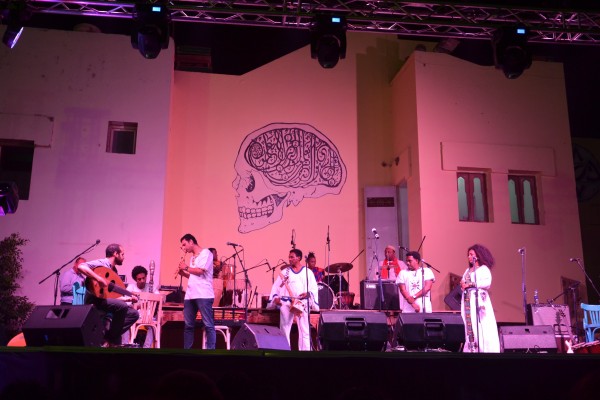![The Nile Project is an initiative to bring together the cultural diversity of the Nile through music, education and empowerment [Yasmeen Shaheen]](http://www.auccaravan.com/wp-content/uploads/2016/11/DSC_6995-e1478293910586.jpg)
@YasmeenShaheenn @Mariamsherif15
As the longest river in the world, the Nile has been the cause of much of the region’s resource-driven tension over the years, and remains so until today.
The Nile Project seeks to end such conflict by blending in cultural approaches to education, empowerment and music.
Gathering musicians from countries neighboring the river to create a new sound, the Nile Project strives to promote a brand of African unity that will forge a new cultural identity the entire Nile Basin can share.
Originally an environmental initiative, the Project was meant to bring together various musical groups to raise awareness on the need to develop a sustainable and shared ecosystem.
However, the Project has since then expanded and now includes a variety of workshops that answer questions on resource conflict and cultural coexistence.
Under the leadership of its founder Mina Guirguis, who studied ethnomusicology in the United States, these workshops now operate n conjunction with six universities, including Cairo University where interested students can apply for a 12-month fellowship.
Commencing this academic year, Nile Project offers a variety of special topics through their workshops ranging from The Nile and African Identity to The Nile and Religion.
“Our agenda is finding solutions to water conflict by engaging with all these layers of society that seem to be isolated from the problem… Most don’t really know where to start from when it comes to the Nile,” Guirguis told The Caravan.
Aside from academic workshops, the Nile Project also features extensive musical ones. Their latest was on percussion where each participant tells the audience an anecdote about their home country and instructs them with their own unique style of music.
“I have been working in the music field since the 90s, and I joined the Nile Project in January to revive the Egyptian identity again,” Salib Fawzi, an Egyptian singer, said when asked about the reasons for joining the Nile Project.
The five-year program has shown has grown considerably over the years. Their latest tours were in the United States, where they stayed for four months before heading to Europe for a month.
Taking place primarily in the Greek Campus, the Nile Project invites musicians in Egypt annually to perform on stage.
“I wanted to give people a real feel of authentic Egyptian music. This is our identity; it’s who we are,” Fawzi said.
Their latest concert, held in Darb 1718, had a full house and was mostly received among the audience.
“It is amazing how much the music can touch your heart and make you feel like you have something in common with all these people, even though they come from different countries,” attendee and applied arts student at the German University in Cairo Dina Saeed told The Caravan.
The performances all include a combination of cultures; one of their performances was comprised of a Kenyan, an Ethiopian and an Egyptian all dressed in the traditional attire of their own country but performing together.
“I discovered that joining the Nile Project had really changed me, because these are cultures we share the Nile with and there’s something there that’s connecting us all I want to know more about,” Kenyan singer Kassifa Motwa said.
